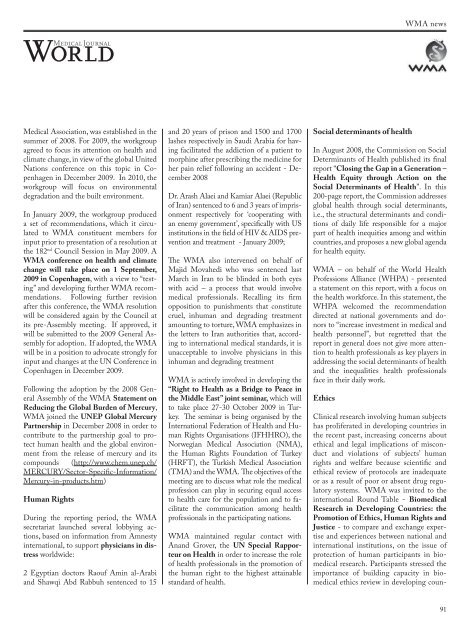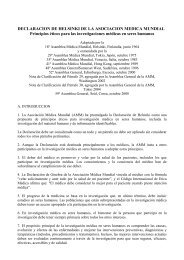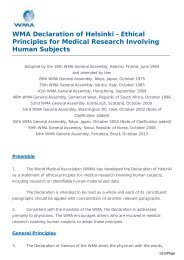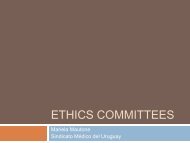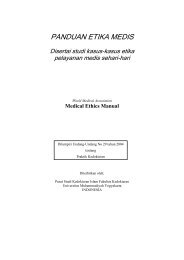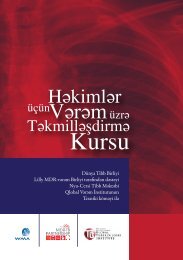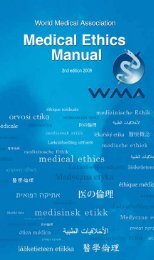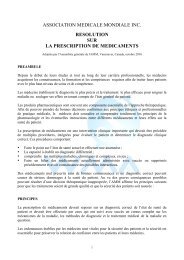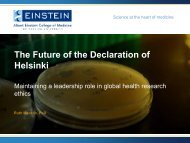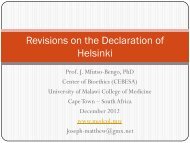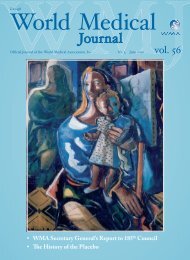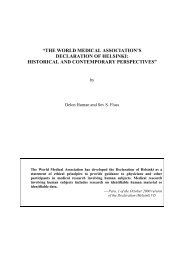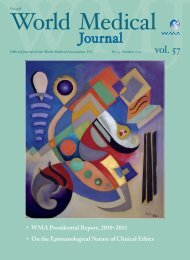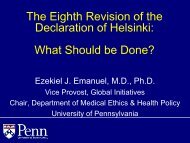wma 7-2.indd - World Medical Association
wma 7-2.indd - World Medical Association
wma 7-2.indd - World Medical Association
Create successful ePaper yourself
Turn your PDF publications into a flip-book with our unique Google optimized e-Paper software.
WMA news<br />
<strong>Medical</strong> <strong>Association</strong>, was established in the<br />
summer of 2008. For 2009, the workgroup<br />
agreed to focus its attention on health and<br />
climate change, in view of the global United<br />
Nations conference on this topic in Copenhagen<br />
in December 2009. In 2010, the<br />
workgroup will focus on environmental<br />
degradation and the built environment.<br />
In January 2009, the workgroup produced<br />
a set of recommendations, which it circulated<br />
to WMA constituent members for<br />
input prior to presentation of a resolution at<br />
the 182 nd Council Session in May 2009. A<br />
WMA conference on health and climate<br />
change will take place on 1 September,<br />
2009 in Copenhagen, with a view to “testing”<br />
and developing further WMA recommendations.<br />
Following further revision<br />
after this conference, the WMA resolution<br />
will be considered again by the Council at<br />
its pre-Assembly meeting. If approved, it<br />
will be submitted to the 2009 General Assembly<br />
for adoption. If adopted, the WMA<br />
will be in a position to advocate strongly for<br />
input and changes at the UN Conference in<br />
Copenhagen in December 2009.<br />
Following the adoption by the 2008 General<br />
Assembly of the WMA Statement on<br />
Reducing the Global Burden of Mercury,<br />
WMA joined the UNEP Global Mercury<br />
Partnership in December 2008 in order to<br />
contribute to the partnership goal to protect<br />
human health and the global environment<br />
from the release of mercury and its<br />
compounds (http://www.chem.unep.ch/<br />
MERCURY/Sector-Specific-Information/<br />
Mercury-in-products.htm)<br />
Human Rights<br />
During the reporting period, the WMA<br />
secretariat launched several lobbying actions,<br />
based on information from Amnesty<br />
international, to support physicians in distress<br />
worldwide:<br />
2 Egyptian doctors Raouf Amin al-Arabi<br />
and Shawqi Abd Rabbuh sentenced to 15<br />
and 20 years of prison and 1500 and 1700<br />
lashes respectively in Saudi Arabia for having<br />
facilitated the addiction of a patient to<br />
morphine after prescribing the medicine for<br />
her pain relief following an accident - December<br />
2008<br />
Dr. Arash Alaei and Kamiar Alaei (Republic<br />
of Iran) sentenced to 6 and 3 years of imprisonment<br />
respectively for ‘cooperating with<br />
an enemy government’, specifically with US<br />
institutions in the field of HIV & AIDS prevention<br />
and treatment - January 2009;<br />
The WMA also intervened on behalf of<br />
Majid Movahedi who was sentenced last<br />
March in Iran to be blinded in both eyes<br />
with acid – a process that would involve<br />
medical professionals. Recalling its firm<br />
opposition to punishments that constitute<br />
cruel, inhuman and degrading treatment<br />
amounting to torture, WMA emphasizes in<br />
the letters to Iran authorities that, according<br />
to international medical standards, it is<br />
unacceptable to involve physicians in this<br />
inhuman and degrading treatment<br />
WMA is actively involved in developing the<br />
“Right to Health as a Bridge to Peace in<br />
the Middle East” joint seminar, which will<br />
to take place 27-30 October 2009 in Turkey.<br />
The seminar is being organised by the<br />
International Federation of Health and Human<br />
Rights Organisations (IFHHRO), the<br />
Norwegian <strong>Medical</strong> <strong>Association</strong> (NMA),<br />
the Human Rights Foundation of Turkey<br />
(HRFT), the Turkish <strong>Medical</strong> <strong>Association</strong><br />
(TMA) and the WMA. The objectives of the<br />
meeting are to discuss what role the medical<br />
profession can play in securing equal access<br />
to health care for the population and to facilitate<br />
the communication among health<br />
professionals in the participating nations.<br />
WMA maintained regular contact with<br />
Anand Grover, the UN Special Rapporteur<br />
on Health in order to increase the role<br />
of health professionals in the promotion of<br />
the human right to the highest attainable<br />
standard of health.<br />
Social determinants of health<br />
In August 2008, the Commission on Social<br />
Determinants of Health published its final<br />
report “Closing the Gap in a Generation –<br />
Health Equity through Action on the<br />
Social Determinants of Health”. In this<br />
200-page report, the Commission addresses<br />
global health through social determinants,<br />
i.e., the structural determinants and conditions<br />
of daily life responsible for a major<br />
part of health inequities among and within<br />
countries, and proposes a new global agenda<br />
for health equity.<br />
WMA – on behalf of the <strong>World</strong> Health<br />
Professions Alliance (WHPA) - presented<br />
a statement on this report, with a focus on<br />
the health workforce. In this statement, the<br />
WHPA welcomed the recommendation<br />
directed at national governments and donors<br />
to “increase investment in medical and<br />
health personnel”, but regretted that the<br />
report in general does not give more attention<br />
to health professionals as key players in<br />
addressing the social determinants of health<br />
and the inequalities health professionals<br />
face in their daily work.<br />
Ethics<br />
Clinical research involving human subjects<br />
has proliferated in developing countries in<br />
the recent past, increasing concerns about<br />
ethical and legal implications of misconduct<br />
and violations of subjects’ human<br />
rights and welfare because scientific and<br />
ethical review of protocols are inadequate<br />
or as a result of poor or absent drug regulatory<br />
systems. WMA was invited to the<br />
international Round Table - Biomedical<br />
Research in Developing Countries: the<br />
Promotion of Ethics, Human Rights and<br />
Justice - to compare and exchange expertise<br />
and experiences between national and<br />
international institutions, on the issue of<br />
protection of human participants in biomedical<br />
research. Participants stressed the<br />
importance of building capacity in biomedical<br />
ethics review in developing coun-<br />
91


